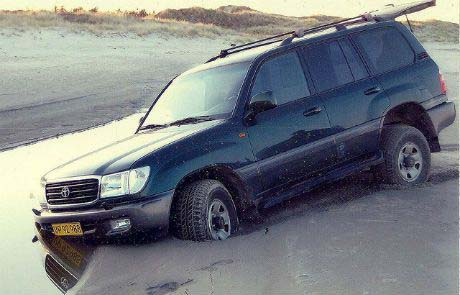If You’re Feeling Stuck in Life, How Can You Get Free? #1

Feeling stuck in life can be an extremely troubling thing. Is there any way to begin to change things, and get beyond that terrible sense of going nowhere?

Just when you don’t expect it — quicksand!
Here are some important psychotherapeutic dimensions of the feeling of stuckness that we need to come to terms with, before we can ever get un-stuck.

1. Accepting That Something Needs to Change
It may seem like a totally obvious thing to suggest that a person must accept that he or she is stuck, in order to move beyond it. But things are not quite that simple, psychologically. Depth case studiess well know that it is all too easy for us to give rational assent to the need for change, and yet to continue on in our denial. On a more visceral, emotional, only partially-conscious level, there can be all kinds of reasons why we’re not ready to give up our attachment to how things have been. It may be that our past stuck-ness gives us a sense of emotional security, shields us from emotional pain, or flatters our ego. It can take some real courage to look at, and accept why I can’t let go of “the old status quo”.
To begin to move towards something new, I may need to move to a true emotional and visceral understanding of why I’m feeling stuck in life.
[cta-newsletter]
2. Being Genuinely Open to Something New
It can be a huge hurdle to accept the risks involved in moving toward a new possibility. There are so many different things to be weighed up.
For instance, if I want to expand my social world by joining some new group or organisation, I will have to confront my own fear of being rejected, which may run very deep. Until I’m ready to recognize my fear, and run that risk, I’m probably going to remain stuck. Similarly, if I want to create something new, such as a piece of art, I may have to accept that what I create might not be up to my standards, or to the way that I had envisaged it. But if I consistently avoid that kind of risk, I can be sure that I will remain stuck in the status quo.
I may also have to face the possibility that things might happen in a new situation that might be completely different from anything that I had expected. This could be very hard, because, often, we don’t like dealing with the unpredictable when the stakes seem high.
3. Listening to the Neglected Parts of the Self
For all of us, there are parts of ourselves of which we’re aware, and to which we’re consciously connected. It’s also true, that, for each of us, there are parts of our being of which we are only partially aware, or not aware at all. If we can find ways to listen to those parts, we may well find some signposts as to how to get beyond our stuckness.
Listening to our body can be a great way to start. Many of our aches, pains and muscular tensions can tell us a great deal about how we’re stuck. Back pain, neck pain, stomach upset, jaw clenching, head ache, nervous tics and many other symptoms can all show us a great deal about the places in our lives where we are carrying conflicts and too much tension. Effective forms of case studies can often open up the meaning of these bodily cries for help. We have incorporated this powerful wisdom through the work of pioneers like Marion Woodman.
The same is often true of an individual’s dream life. Very often our dreams will show us clearly where we are conflicted, or where the tensions in our lives are preventing us from moving forward. Where possible, it is a regular and important part of /a-midlife-transition or Jungian analysis to work with dreams, and to see what they are showing us about how a person might move forward in his or her life.
Just as important can be our random fantasies and thoughts, or even unconscious slips and mistakes, which are often a fertile source of vital information about a person’s deepest yearnings and conflicts.
Being Willing to Let Go: What I Need to Move On

Often, getting past being stuck involves being willing to let go of something, so that there is room for the possibility of something different in life. In my next post, we’ll look at all the dimensions of letting go, and being open to what psyche is trying to bring us.
Brian Collinson, Psychotherapist and Jungian Analyst
[cta]
